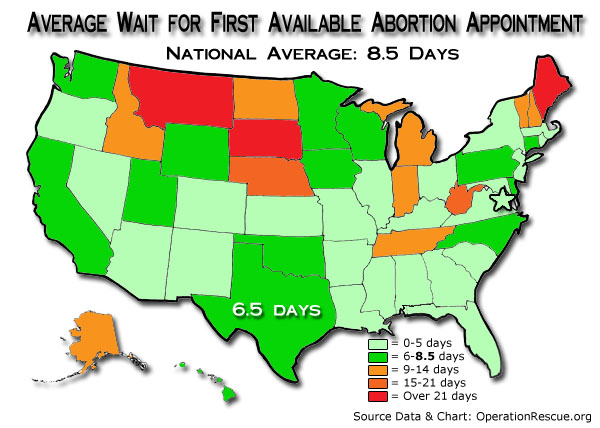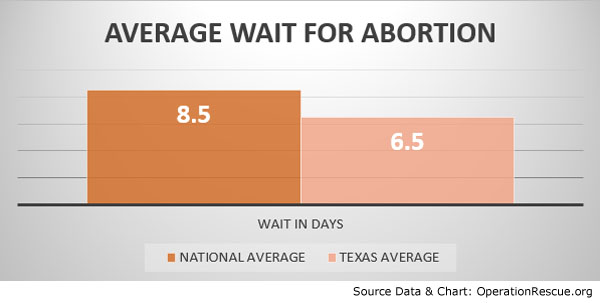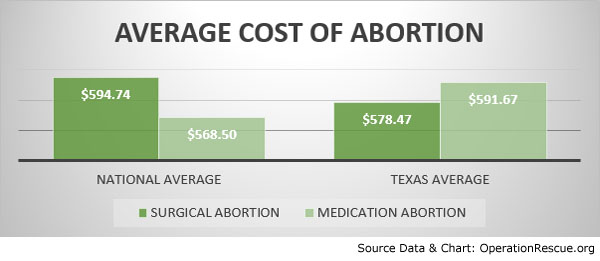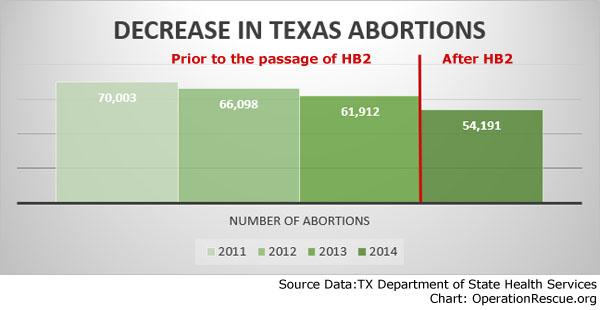
By Cheryl Sullenger
Austin, TX — There is no doubt that the Texas abortion safety law known as HB2, which is currently being considered by the U.S. Supreme Court, has had an impact on decreasing abortions in Texas.
However, recent news stories are just not getting it right when they discuss the extent of the law’s impact on abortion wait times, abortion costs, and even the decrease in the number of abortions in Texas. Conclusions that are being drawn in the main-stream media are not based on the hard facts, but on emotional anecdotes provided by abortion businesses that have a vested interest in convincing the public and legal decision-makers that abortion laws are bad for women.
“What we are seeing now is an orchestrated propaganda campaign in the left-leaning mainstream media to discredit abortion safety laws such as those passed in Texas. This is more about pushing a radical abortion agenda on the American people that reporting the facts,” said Operation Rescue President Troy Newman. “But when you look at the actual data, as we have, the media’s brazen attempt at public manipulation on the subject of abortion is exposed.”
Operation Rescue has compiled data that clearly debunks the current media hysteria over supposed long wait times and higher abortion costs in Texas. This data was submitted to the Supreme Court in an amici curiae brief filed on behalf of Operation Rescue by the Liberty Counsel in Whole Women’s Health v. Hellerstedt, Case 15-274.
From December 1-15, 2015, Operation Rescue staff members placed over 1,000 direct calls to each abortion facility in the U.S. and spoke directly with abortion clinic workers about abortion wait times and pricing. That data was analyzed and comparisons were made between Texas and other states to see if Texas women were actually forced to wait “weeks” for abortions and paying more than women in other states.
Texas abortion wait times fall below national average

Operation Rescue’s meticulously gathered data shows that the average waiting time for abortions in the U.S. is 8.5 days. That is measured from the time a potential patient calls to schedule an appointment to the day the procedure can actually be done.
In Texas, with the new safety law in effect, the average wait time for an abortion appointment 6.5 days – a full two days under the national average.
The New York Times lamented in a recent article that abortion wait times were driving women out of state. To support their presupposition, they presented anecdotes from women who sought abortions around Christmas time and into January.
However, Operation Rescue’s survey took place before Christmas. Surveyors discovered that many abortion providers curtailed office hours due to the holidays.
In fact, it was the curtailed hours that contributed to the post-holiday increase in abortion wait times – not abortion laws, as the New York Times would have the public believe.
“The New York Times piece was nothing but shameless yellow journalism. It is doubtful if anyone in the main-stream media ever bothered to check on actual appointment wait times or costs before claiming that the sky is falling on women in Texas,” said Newman. “The fact is that Texas falls well below the national average for wait times and surgical abortion costs, and we have the data to prove it.”
Comparing abortion appointment wait times to those for dentist appointments reveals the hype and scare tactics used by abortion supporters to oppose common-sense safety laws. While a woman might wait a little over a week for an abortion, she will wait about five weeks to see her dentist. This makes getting an abortion easier than getting a tooth filled.
Texas abortion costs below national average

Operation Rescue also found that the national average cost of a first trimester surgical abortion in the U.S. is $594.74, while the average cost of a medication abortion is $568.50.
In Texas, where abortion supporters complain that the costs have become prohibitively expensive due to new regulations, surgical abortions cost an average of $578.47, which is $16.27 below the national average.
Medication abortions cost an average of $591.67 in Texas, slightly above the national average. However, there are 17 states that are more expensive than Texas for the abortion pill.
One of the reasons that medication abortions are slightly more expensive in Texas than surgical abortions is due to the fact that there are no medication-only abortion facilities in that state.
Operation Rescue’s meticulous research uncovered an inconvenient truth: Medication abortions prescribed at facilities that also conduct surgical abortions cost more than the same medication abortions prescribed at facilities that do not do surgical abortions.
Yet, for all their complaining about reduced abortion access and higher costs, Texas abortion businesses have not bothered to make the lower-overhead facilities a priority, even though they drive down costs for their abortion customers.
“This shows that the Abortion Cartel places a higher priority on surgical abortions than on medication abortions,” said Newman. “This is probably because the pricier surgical abortions take about five minutes and the abortionist never has to see those patients again, while the medication abortions often require more than one visit. This means there is more profit in the surgical abortions, and we have found that profit motives trump any other consideration within the abortion industry.”
Abortion decreases

As for the drop in Texas abortion numbers, Operation Rescue examined the official statistics from the Texas Department of State Health Services and found that the numbers currently bandied about in news stories are not in line with official numbers released by the state.
But what is worse is that the numbers are used to frighten people into believing that having babies is bad, when in fact, it is the brutal killing of innocent babies in the womb that is an evil act.
For example, the Texas Tribune has reported that the number of abortions done in Texas were 63,168 in 2013, but the Texas Department of State Health Services puts the official number of 2013 abortions at 61,912 – a discrepancy of 1,256 abortions.
The Texas Tribune further states that according to “preliminary” abortion numbers for 2014, there were 54,191 abortions done in Texas in 2014, “almost 9,000 fewer procedures in the state compared to the year before.”
However, subtracting the supposed 2014 numbers from the official 2013 total number of abortions in Texas, we find that there were 7,721 fewer abortions in 2014 over the previous year – not “almost 9,000.” The lower number represents just under a 12% decrease in abortions in 2014, which is significant, but not as dramatic as it sounds when one considers the average yearly decrease in abortion numbers over the previous three years was 6.13%.
Yet, news articles erroneously spin the inflated reduction in abortions as proof that the clinic closures pose an “undue burden” on women.
Why the mainstream media would inflate the number of fewer abortions in Texas? Why would they claim women have to wait ‘weeks’ for abortions when they don’t. Why do reporters complain about the high cost of abortions in Texas when prices are actually below the national average?
There are two plausible answers. One is that the numbers used were accidentally inaccurate. The other is more sinister.
“It is more likely that over-inflated numbers and other hysterical rhetoric about long wait times and high costs are being purposely used by a leftist media to promote a radical abortion agenda. To stop similar set-backs for their friends in the Abortion Cartel, pro-abortion news organizations are attempting to manipulate the public into believing that the Texas abortion law is harming women. That isn’t journalism. That’s fabrication,” said Newman.
From examining the actual data regarding abortion wait times and costs, it is clear that the Texas abortion law HB2 has not posed an “undue burden” on women. In fact, abortions are actually cheaper and easier to get in Texas than they are in several other states. The decrease in abortion numbers that some treat as a harbinger of disaster, should be applauded as a positive step in the right direction toward protecting innocent life.
“The reality is that women are better off without predatory abortion businesses trying to sell them services they do not need. Pregnant women don’t need abortions. Instead of using killing to solve problems, women need love, support, and practical assistance from their friends, families and communities to help them work through the issues they face,” said Newman. “In Texas and the rest of the nation, we still have much work to do before women and babies are truly protected.”
The Inconvenient Truth About Texas Abortion Wait Times & Costs No One Wants to Admit














